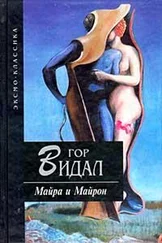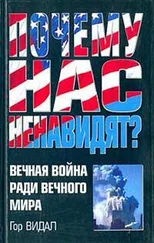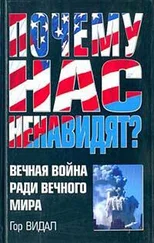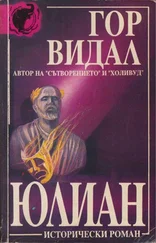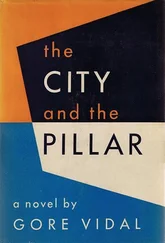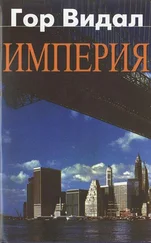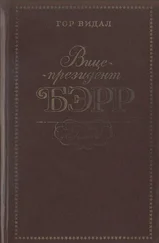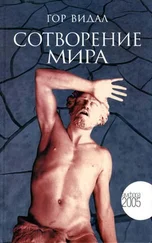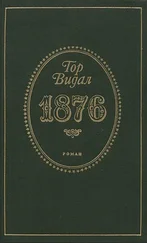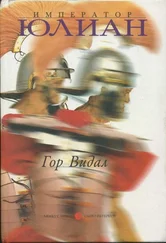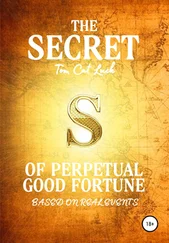Гор Видал - Perpetual War For Perpetual Peace
Здесь есть возможность читать онлайн «Гор Видал - Perpetual War For Perpetual Peace» весь текст электронной книги совершенно бесплатно (целиком полную версию без сокращений). В некоторых случаях можно слушать аудио, скачать через торрент в формате fb2 и присутствует краткое содержание. Жанр: Проза, на английском языке. Описание произведения, (предисловие) а так же отзывы посетителей доступны на портале библиотеки ЛибКат.
- Название:Perpetual War For Perpetual Peace
- Автор:
- Жанр:
- Год:неизвестен
- ISBN:нет данных
- Рейтинг книги:5 / 5. Голосов: 1
-
Избранное:Добавить в избранное
- Отзывы:
-
Ваша оценка:
- 100
- 1
- 2
- 3
- 4
- 5
Perpetual War For Perpetual Peace: краткое содержание, описание и аннотация
Предлагаем к чтению аннотацию, описание, краткое содержание или предисловие (зависит от того, что написал сам автор книги «Perpetual War For Perpetual Peace»). Если вы не нашли необходимую информацию о книге — напишите в комментариях, мы постараемся отыскать её.
Perpetual War For Perpetual Peace — читать онлайн бесплатно полную книгу (весь текст) целиком
Ниже представлен текст книги, разбитый по страницам. Система сохранения места последней прочитанной страницы, позволяет с удобством читать онлайн бесплатно книгу «Perpetual War For Perpetual Peace», без необходимости каждый раз заново искать на чём Вы остановились. Поставьте закладку, и сможете в любой момент перейти на страницу, на которой закончили чтение.
Интервал:
Закладка:
Another lead not followed up: McVeigh's sister read a letter he wrote her to the grand jury stating that he had become a member of a "Special Forces Group involved in criminal activity."
At the end, McVeigh, already condemned to death, decided to take full credit for the bombing. Was he being a good professional soldier, covering up for others? Or did he, perhaps, now see himself in a historic role with his own private Harper's Ferry, and though his ashes molder in the grave, his spirit is marching on? We may know — one day.
As for "the purposes of state police power," after the bombing, Clinton signed into law orders allowing the police to commit all sorts of crimes against the Constitution in the interest of combating terrorism. On April 20, 1996 (Hitler's birthday of golden memory, at least for the producers of The Producers ), President Clinton signed the Anti-Terrorism Act ("for the protection of the people and the state" — the emphasis, of course, is on the second noun), while, a month earlier, the mysterious Louis Freeh had informed Congress of his plans for expanded wiretapping by his secret police. Clinton described his Anti-Terrorism Act in familiar language (March 1,1993, USA Today ): "We can't be so fixated on our desire to preserve the rights of ordinary Americans." A year later (April 19, 1994, on MTV): "A lot of people say there's too much personal freedom. When personal freedom's being abused, you have to move to limit it." On that plangent note he graduated cum laude from the Newt Gingrich Academy.
In essence, Clinton's Anti-Terrorism Act would set up a national police force, over the long-dead bodies of the founders. Details are supplied by H.R. 97, a chimera born of Clinton, Reno, and the mysterious Mr. Freeh. A twenty-five-hundred-man Rapid Deployment Strike Force would be organized, under the attorney general, with dictatorial powers. The chief of police of Windsor, Missouri, Joe Hendricks, spoke out against this supra-Constitutional police force. Under this legislation, Hendricks said, "an agent of the FBI could walk into my office and commandeer this police department. If you don't believe that, read the crime bill that Clinton signed into law. There is talk of the Feds taking over the Washington, D.C., police department. To me this sets a dangerous precedent." But after a half-century of the Russians are coming, followed by terrorists from proliferating rogue states as well as the ongoing horrors of drug-related crime, there is little respite for a people so routinely — so fiercely — disinformed. Yet there is a native suspicion that seems to be a part of the individual American psyche — as demonstrated in polls, anyway. According to a Scripps Howard News Service poll, 40 percent of Americans think it quite likely that the FBI set the fires at Waco. Fifty-one percent believe federal officials killed Jack Kennedy (Oh, Oliver what hast thou wrought!). Eighty percent believe that the military is withholding evidence that Iraq used nerve gas or something as deadly in the Gulf. Unfortunately, the other side of this coin is troubling. After Oklahoma City, 58 percent of Americans, according to the Los Angeles Times , were willing to surrender some of their liberties to stop terrorism — including, one wonders, the sacred right to be misinformed by government?
Shortly after McVeigh's conviction, Director Freeh soothed the Senate Judiciary Committee: "Most of the militia organizations around the country are not, in our view, threatening or dangerous." But earlier, before the Senate Appropriations Committee, he had "confessed" that his bureau was troubled by "various individuals, as well as organizations, some having an ideology which suspects government of world-order conspiracies — individuals who have organized themselves against the United States." In sum, this bureaucrat who does God's Work regards as a threat those "individuals who espouse ideologies inconsistent with principles of Federal Government." Oddly, for a former judge, Freeh seems not to recognize how chilling this last phrase is.
The CIA's former director William Colby is also made nervous by the disaffected. In a chat with Nebraska state senator John Decamp (shortly before the Oklahoma City bombing), he mused, "I watched as the Anti-War movement rendered it impossible for this country to conduct or win the Viet Nam War. This Militia and Patriot movement. is far more significant and far more dangerous for Americans than the Anti-War movement ever was, if it is not intelligently dealt with. It is not because these people are armed that America need be concerned.'' Colby continues, "They are dangerous because there are so many of them. It is one thing to have a few nuts or dissidents. They can be dealt with, justly or otherwise [my emphasis] so that they do not pose a danger to the system. It is quite another situation when you have a true movement — millions of citizens believing something, particularly when the movement is made up of society's average, successful citizens." Presumably one "otherwise" way of handling such a movement is when it elects a president by a half-million votes — to call in a like-minded Supreme Court majority to stop a state's recounts, create arbitrary deadlines, and invent delays until our ancient electoral system, by default, must give the presidency to the "system's" candidate as opposed to the one the people voted for.
Many an "expert" and many an expert believe that McVeigh neither built nor detonated the bomb that blew up a large part of the Murrah Federal Building on April 19, 1995. To start backward — rather the way the FBI conducted this case — if McVeigh was not guilty, why did he confess to the murderous deed? I am convinced from his correspondence and what one has learned about him in an ever lengthening row of books that, once found guilty due to what he felt was the slovenly defense of his principal lawyer, Stephen Jones, so unlike the brilliant defense of his "co-conspirator" Terry Nichols's lawyer Michael Tigar, McVeigh believed that the only alternative to death by injection was a half-century or more of life in a box. There is another aspect of our prison system (considered one of the most barbaric in the First World) that was alluded to by a British writer in The Guardian . He quoted California's attorney general, Bill Lockyer, on the subject of the C.E.O. of an electric utility, currently battening on California's failing energy supply. '"I would love to personally escort this CEO to an 8 by 10 cell that he could share with a tattooed dude who says—"Hi, my name is Spike, Honey."'. The senior law official in the state was confirming (what we all suspected) that rape is penal policy. Go to prison and serving as a Hell's Angel sex slave is judged part of your sentence." A couple of decades fending off Spike is not a Henley hero's idea of a good time. Better dead than Spiked. Hence, "I bombed the Murrah building."
Evidence, however, is overwhelming that there was a plot involving militia types and government infiltrators — who knows? — as prime movers to create panic in order to get Clinton to sign that infamous Anti-Terrorism Act. But if, as it now appears, there were many interested parties involved, a sort of unified-field theory is never apt to be found, but should there be one, Joel Dyer may be its Einstein. (Einstein, of course, never got his field quite together, either.) In 1998, I read Dyer's Harvest of Rage . Dyer was editor of the Boulder Weekly . He writes on the crisis of rural America due to the decline of the family farm, which also coincided with the formation of various militias and religious cults, some dangerous, some merely sad. In Harvest of Rage , Dyer made the case that McVeigh and Terry Nichols could not have acted alone in the Oklahoma City bombing. Now he has, after long investigation, written an epilogue to the trials of the two coconspirators.
Читать дальшеИнтервал:
Закладка:
Похожие книги на «Perpetual War For Perpetual Peace»
Представляем Вашему вниманию похожие книги на «Perpetual War For Perpetual Peace» списком для выбора. Мы отобрали схожую по названию и смыслу литературу в надежде предоставить читателям больше вариантов отыскать новые, интересные, ещё непрочитанные произведения.
Обсуждение, отзывы о книге «Perpetual War For Perpetual Peace» и просто собственные мнения читателей. Оставьте ваши комментарии, напишите, что Вы думаете о произведении, его смысле или главных героях. Укажите что конкретно понравилось, а что нет, и почему Вы так считаете.

